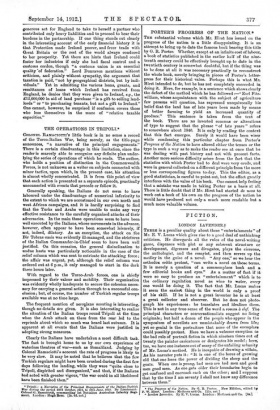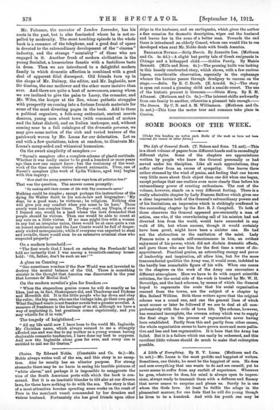FICTION.
LONDON LAVENDER.t
THERE is a peculiar quality about these "entertainments" of Mr. E. V. Lucas which gives rise to a good deal of unthinking criticism. He disregards all the rules of the novel-writing game, dispenses with plot or any coherent structure or development, digresses and divagates, plays the cicerone, the anthologist, and the essayist, and then serves up the medley in the guise of a novel. "Any one," so we hear the orthodox critic protest, "can write a novel on those terms. It is merely a question of a commonplace book and a few editorial hooks and eyes." As a matter of fact if it were so easy to produce an " entertainment " which is to the ordinary regulation novel as wine to water, every one would be doing it. The fact that Mr. Lucas makes it seem the easiest thing in the world is only a proof of his skill. If he is not a great inventor he is at least a great collector and observer. But he does not photo- graph his experiences : he translates and idealises them. This is not in any true sense of the word a roman a clef. The
principal characters or conversationalists suggest no living originals ; but half a dozen of the people who appear in the symposium of novelists are unmistakably drawn from life; yet so genial is the portraiture that none of the exemplars could possibly protest. Here we have a welcome exception to the bad rule of portrait fiction in which nineteen times out of twenty the painter caricatures or denigrates his model ; here, too, we have one instance out of many of the unfailing urbanity of Mr. Lucas's method. He is incapable of drawing a villain.
As his narrator puts it : "It is one of the bores of growing old that one loses the power of dividing the sheep and the goats. When one is young, bad men are bad men and good men good men. As one gets older their boundaries begin to get confused and encroach each on the other; and I suppose that by the time I am seventy I shall not know any difference between them."
• The Progress of the Nation. By G. IL Porter. New Edition, edited by F. W. Hirst. London: Methuen and Co. [21s. net.1 • ▪ londea Lavender. By E. V. Lucas. London : Methuen and Co. Usa
Mr. Falconer, the narrator of London Lavender, has his roots in the past, but is also fascinated where he is not re- pelled by modernity. The most touching episode in the whole book is a romance of the telephone, and a good deal of space is devoted to the extraordinary development of the "cinema" industry, and the strange " mentality " of those who are engaged in it. Another freak of modern civilization is the young Socialist, a humourless fanatic with a fastidious taste in dress. Then we are introduced to a delightful modern family in which domestic affection is combined with a good deal of apparent filial disrespect. Old friends turn up in the shape of Mr. Dabney, the editor, and Mr. Ingleside, now Sir Gaston, the one mellower and the other more incisive than ever. And there are quite a host of newcomers, among whom we are inclined to give the palm to Lacey, the crusader, and Mr. Wiles, the keeper at the Zoo, whose pathetic struggles with prosperity on coming into a fortune furnish materials for some of the most diverting pages in the book. Add to these a political organizer, a folk-song enthusiast, ancient morris dancers, young men about town (with command of motors and the latest dialect), and an Italian innkeeper, and, without coming near to a full catalogue of the dramatis person, we may give some notion of the rich and varied texture of the patchwork woven by Mr. Lucas for our delectation. Let us end with a few quotations, taken at random, to illustrate Mr. Lucas's many-sided and whimsical humanism.
On the sweet simplicity of samplers :— "Naomi's samplers offer a complete scheme of placid rectitude. Whether it was really easier to be good a hundred or more years ago than now one cannot know : but the testimony of the wool- work of the time makes virtue almost automatic. Thus, one of Naomi's samplers (the work of Lydia Vickers, aged ten) begins with this inquiry :
' How shall the young preserve their ways from all pollution free ?' That was the question. The answer comes promptly: By making still their course of life with Thy commands agree.'
Nothing could be simpler ; except perhaps the instructions of the dying Sir Walter Scott to his son-in-law and biographer : My
dear, be a good man; be virtuous ; be religious. Nothing else will give you any comfort when you come to lie here.' Those surely were less complex times. To-day—well, ray Utopia, if ever
I framed one, would be a land where the laws demanded that people should be vicious. Then one would be able to count at any rate on a little virtue. If no man might live with a woman in any but an irregular union, there would be at once quite a run on honest matrimony and the Law Courts would be full of desper- ately wicked monogamists ; while if everyone was expected to steal and swindle, there would soon be an extensive criminal class who respected property."
On a modern household :— "The first words that I heard on entering the Freelands' hall told me instantly that I was among a twentieth-century house- hold: Oh, father, don't be such an ass !' " A gloss on Canning One sometimes wonders if the New World was not invented to destroy the mental balance of the Old. There is something sinister in the thought that America was discovered in the year that Lorenzo de' Medici died."
On the modern novelist's plea for freedom :— "When the stupendous genius comes he will do exactly as he likes, just as, in fact, Shakespeare did, and Thackeray and Dickens and Meredith did. It is the little people who lay down and obey the rules; the big ones, who use the vintage inks, go their own gait. What England wants is not franker novels but a greater novelist. A measure of frankness is the heritage of us all, although we have a way of neglecting it but greatness comes capriciously, and you may whistle for it in vain.'
The tragedy of knighthood :— " All my life until now I have been to the world Mr. Ingleside. My Christian name, which always seemed to me a strangely affected one and was due to my mother as a young woman having deplorable romantic tendencies, I have done my best to suppress. And now the Ingleside alone goes for ever, and every one is entitled to call me Sir Gaston."







































 Previous page
Previous page